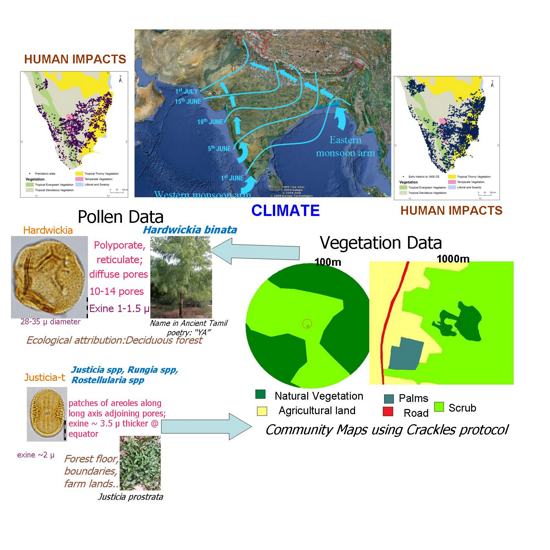Project 1703P: Enhancing quantitative reconstruction skills in South Asian Palynology and Paleoecology
Details
Quantitative methods to reconstruct vegetation history from the Quaternary, especially Holocene, records are now widely applied in temperate areas. In areas such as South Asia, home to a large proportion of tropical vegetation and pivotal in the monsoon system, though, this remains a challenge. The larger aim of the proposed project (1703P) is to address this lacuna in two steps: 1. to try and create a south Asian pollen database and 2. equip palynologists here with the tools necessary to reconstruct past (anthropogenic) landcover quantitatively.
Paleoecology is a discipline dedicated to characterize and understand past vegetational (and in a real sense faunal too, but this aspect is not dealt with here) changes in response to both climate and human activities. This is of central importance to understand and predict the sustainability of ecosystems and their services in the future climatic and socio-economic contexts. Pollen is one of the best available (microscopic) proxies to reconstruct the past vegetation and climate history (Anupama et al, 2014a; Premathilake, 2003, Premathilake and Risberg, 2003 Prabhu et al, 2004; Zorzi et al, 2015) and also to delineate the role of “human impacts” of recent (historic) and also the prehistoric past (Anupama et al, 2014b, Premathilake, 2006, 2012; Premathilake and Gunathilaka, 2013).
Reconstructing the past vegetation at regional level and assessing its responses to climate and/or anthropogenic changes requires strong compilation of a large amount of modern and fossil pollen datasets (Gaillard et al, 2010; Trondman et al, 2015; Mazier et al, 2008; Wanner et al, 2008). Unfortunately, despite the presence of significant climatic and vegetation gradients in South Asia, very limited reliable pollen datasets exist to obtain a quantitative translation, validation and calibration of paleoenvironmental reconstruction in this part of the world. South Asia lacks a comprehensive pollen database of the kinds available in many other parts of the world (EPD, LAPD..) that are useful in model applications referenced above (Davis et al, 2013).
The project seeks to address this by organizing workshop(s) on this theme to help provide a common platform to bring together the community of paleoecologists, ecologists, archeologists, paleoclimatologists and others in the ecological, climate and past climate modeling communities. ECRs and senior researchers from South Asia and exceptionally, beyond, but with expertise in either the technique and/or the area who are interested in pooling their existing (published/ unpublished) pollen and/or vegetation datasets to firstly create such a database for South Asia will be the focus.
The first workshop is planned in January 2018 will aim to not only provide this platform to help them reflect (through focused lecture-discussions) on the underlying philosophy of pollen analysis and what its application in tropical south Asia can bring to the science of climate and landcover changes and the anthropocene, but also hands-on experience in doing it using the experience of the project leaders. In practical terms, the planned workshop will provide a material basis to kick start a regional/ sub-regional pollen database and equip the participants with methods and protocols and introduce them to relevant software for quantitative land cover reconstruction using pollen.
Notable gaps that the project tries to address include the (i) absence of a comprehensive regional pollen database, (ii) the absence of quantitative pollen–vegetation relationships in the challenging tropical conditions for applications in models such as REVEALS and LOVE (Sugita, 2007) and (iii) absence of Pollen Productivity Estimates for tropical taxa to be used in landcover reconstruction. The last gap identified is the application of such quantitative physical proxy-based evidences in archeological sites, especially abundant in the semi-arid tropics.
Links within HABCOM include synergies with the new IFG “Anthropogenic drivers of land cover change” and with Umberto Lombardo’s 1605 Amazon project.
The workshop activities outlined above will seek to provide the selected trainees a mix of talks/ lectures and hands-on practicals, in laboratory, field methodologies that would seek to homogenize data collection methods. Given the context of a definite lack of a pollen database for this region, such an activity would provide the basis for developing one using updated protocols. Specifically, one of the issues central to the development of a database is a uniform definition of pollen taxa at a regional scale. The presence of a very exhaustive collection of herbarium linked pollen slides at the IFP (>22000 slides and >15000 species, 60% tropical) provides a basis to carry out such an exercise with the trainees. It is planned to link with Neotoma and Eric Grimm so as to optimally use an already established expertise on database building for this major starting point.
The trainees to be chosen for this workshop will be Early Career and other Researchers with a prior exposure to Palynology. They will be multidisciplinary though and comprise of people from diverse backgrounds, especially archeologists interested in applying palynology at their sites. Another aspect of focus for this workshop will be to provide the existing protocols for quantifying pollen-vegetation relationships and estimating past landcover through the derivation of pollen productivity estimates for selected taxa within homogenous landscapes and also pin-point some of the pitfalls of using these protocols (for example, transport of pollen through water is not accounted for).
The project will provide a basis for the development of a regional (South Asian or Sub-continent scale) pollen database and for quantitative land cover reconstruction using pollen. Concrete outcomes include validating tropical pollen taxa definitions with the larger south Asian community and evaluating the first pollen productivity estimates of tropical taxa from South India.

Project Leaders
K. Anupama
Institut Français De Pondichéry, Pondicherry – 605 001, India
anupama {dot} k {at} ifpindia {dot} org
Rathnasiri Premathilake
University Of Kelaniya, 407, Bauddhaloka Mawatha, Colombo 7, Sri Lanka
S Prasad
Institut Français De Pondichéry, Laboratory Of Palynology & Paleoecology

